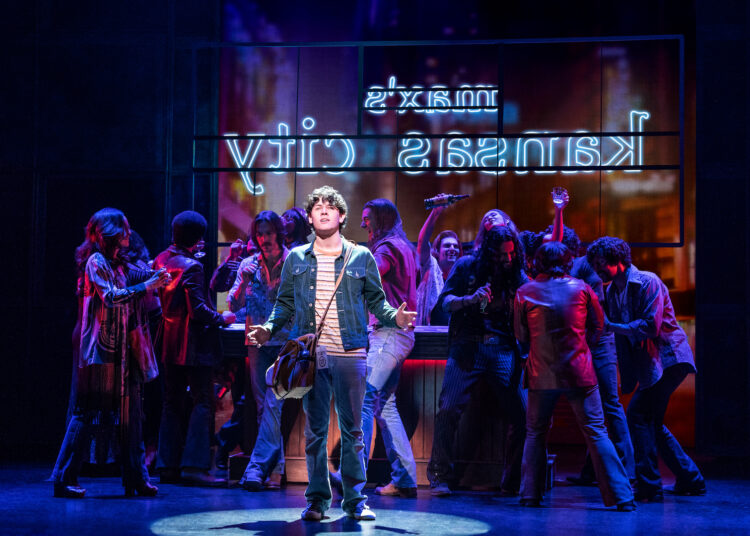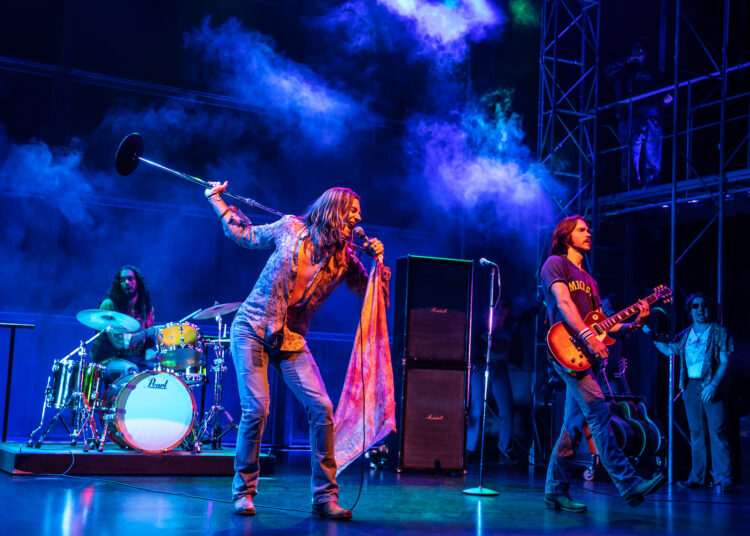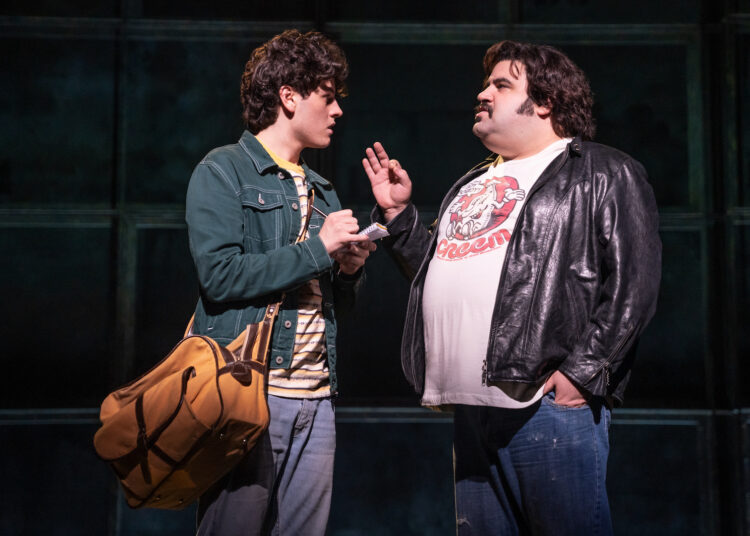****/ ***** (four stars out of five)
The very idea of a Broadway Musical about the world of rock n’ roll is antithetical to the whole concept of the genre. So when Led Zeppelin’s “Ramble On” bursts onto the stage early in Cameron Crowe’s staged rendition of his excellent 2000 film, Almost Famous, one wonders who in that famed rock band was so desperate for cash that they licensed the song. And for how much? Several major staples of classic rock appear in the show which helps an audience of a certain age connect more readily. So, despite all my doubts about seeing songs by Led Zeppelin or the Allman Brothers performed on a contrived stage, I surprise myself when I state, emphatically, that somehow it all works. My rebellious inclinations are muted, and unlike most of my fellow theater critics, I find Almost Famous a surprisingly enjoyable rock musical.

Almost Famous barely qualifies as a “Broadway Musical” in the traditional sense, especially when compared with, say, The Phantom of the Opera or The King and I. Rather, it’s a jukebox musical with a few original, but largely bland, works by the composer/lyricist duo of Tom Kitts and Cameron Crowe. Crowe, a wildly successful movie director (Singles, Jerry Maguire) who won an Oscar for his original film screenplay, is also responsible for the book of this musical. But it’s more like Moulin Rouge, which is stuffed with so many pop music hits that you’re sure to walk away humming an old favorite. The difference is that Almost Famous carries a compelling storyline and characters we care about, which is what made the movie so successful. And it’s exactly how jukebox musicals should, and rarely do, work.
Almost Famous tells story of 15-year-old rock superfan and budding journalist William Miller—a likable, but not overpowering Casey Likes, making his Broadway debut—whose life changes while covering a Black Sabbath concert for the famed rock magazine Creem and its legendary rock critic Lester Bangs. Bangs is ably and comically played by Rob Colletti, though while watching him it’s impossible not to reminisce about the late, great, Phillip Seymour Hoffman who played him perfectly in the film. Bangs explains to the youngster that rock and roll is “over,” despite it being only 1973. Over? “Over. You got here just in time for the death rattle, the last gasp, the last grope,” Bangs admonishes.

Following a series of mix-ups and great timing, William gets the unlikely gig of covering and touring with the fictitious band Stillwater—reportedly loosely based on the Allman Brothers Band, whom Crowe himself covered as a teenager—for Rolling Stone Magazine. Along the way, William, dubbed “The Enemy” by the band because he’s a dreaded rock journalist, befriends The Band-Aids, a group of teenage groupies who follow the rock band around, acting as surrogate girlfriends and superfans. The “goddess” of the groupies, though they loathe being called that, is Penny—who in the film was played by the lovable Kate Hudson, receiving an Oscar nomination for her performance. William and Penny form a bond that likely qualifies as his first bout of unrequited love, for she cares for him but is in love with Stillwater’s lead guitarist.
Many of the production elements are lackluster, from Jerry Herrin’s tepid direction, with characters flitting around the stage in a decidedly un-rock and roll manner; and Derek McLane’s literally two-dimensional set—doors, doors, doors, rolled around on wheels; and frames of actual locales are as deep as it gets. The cast, and their period-correct costumes, courtesy of David Zinn, make the production fly with their enthusiasm and beautiful singing voices.
Technology has made it easier for Broadway orchestras to perform rock hits of the 70s on stage without sounding corny and over-orchestrated, as they once did—hokey renditions of popular rock songs were once a staple of 70s variety shows. Now, the numbers sound like the songs they’re covering, but with vocals that are probably superior, though less edgy than the original. Solea Pfeiffer touches hearts with her rendition, as Penny Lane, whose world is unraveling, of Cat Stevens’ gorgeous and poignant “The Wind.”

Even Chris Wood’s spot-on imitation of Billy Crudup’s film version of Stillwater lead guitarist Russell Hammond is quite satisfying.
Almost Famous soars when the story lines flows, punctuated with its wonderful covers—from Bowie’s “It Ain’t Easy” to Elton John’s “Tiny Dancer” to Stevie Wonder’s “Higher Ground”—but stalls occasionally when we have to hear Stillwater’s tepid hits—like “Fever Dog,” for which they’re best known. But “Fever Dog” sounds more like a rejected Soundgarden song, despite being penned largely by Nancy Wilson of Heart, Crowe’s erstwhile wife.
Nevertheless, the sentimental coming-of-age story keeps you engaged and rooting for love and redemption. Though some may come to the show with expectations rooted in the film’s success a bit too high, it’s still an enjoyable ride.
Almost Famous. Open Run at the Bernard B. Jacobs Theatre (242 West 45th Street, between Broadway and Eighth Avenue). Two hours, ten minutes with one intermission. www.almostfamousthemusical.com












